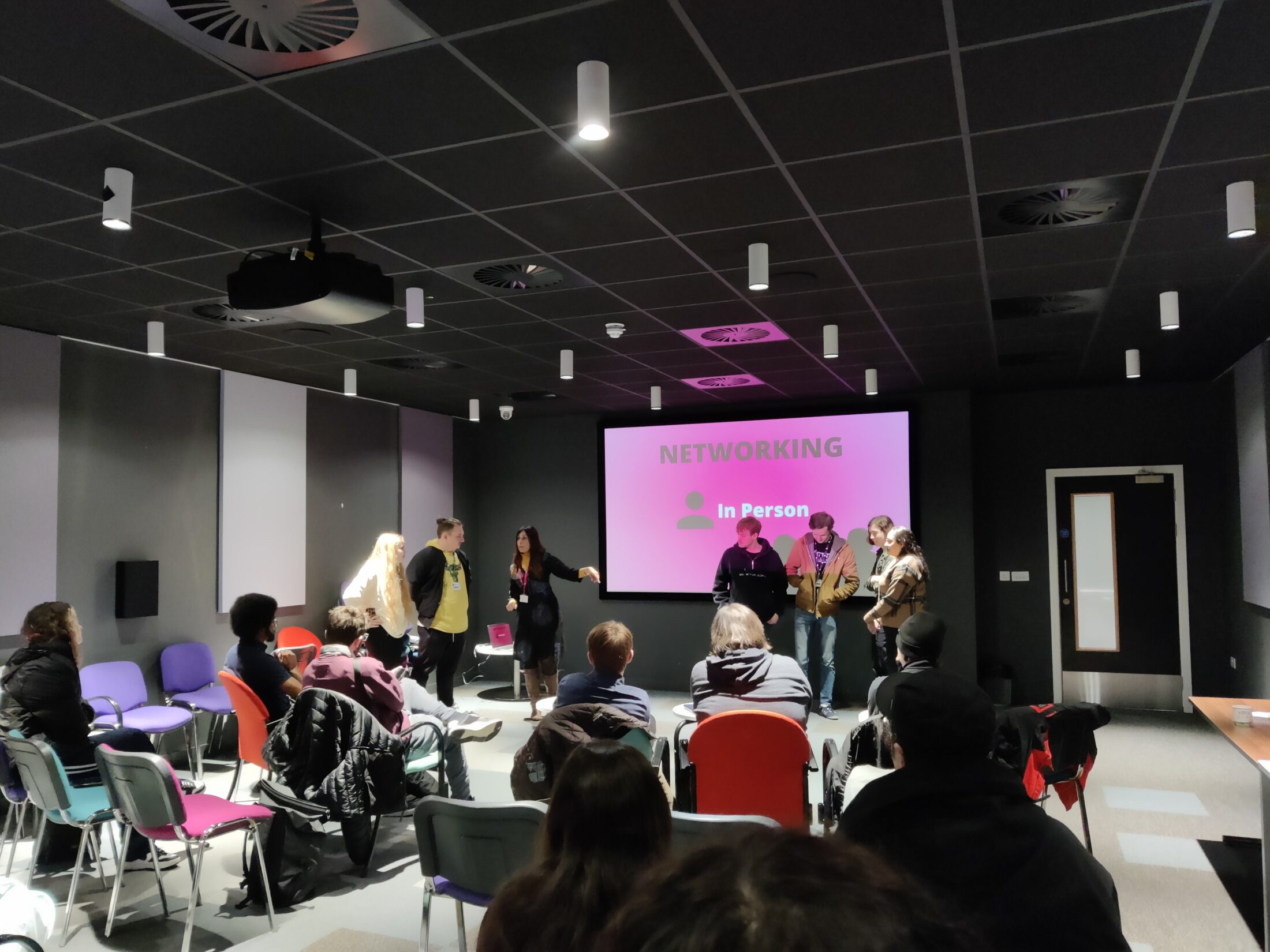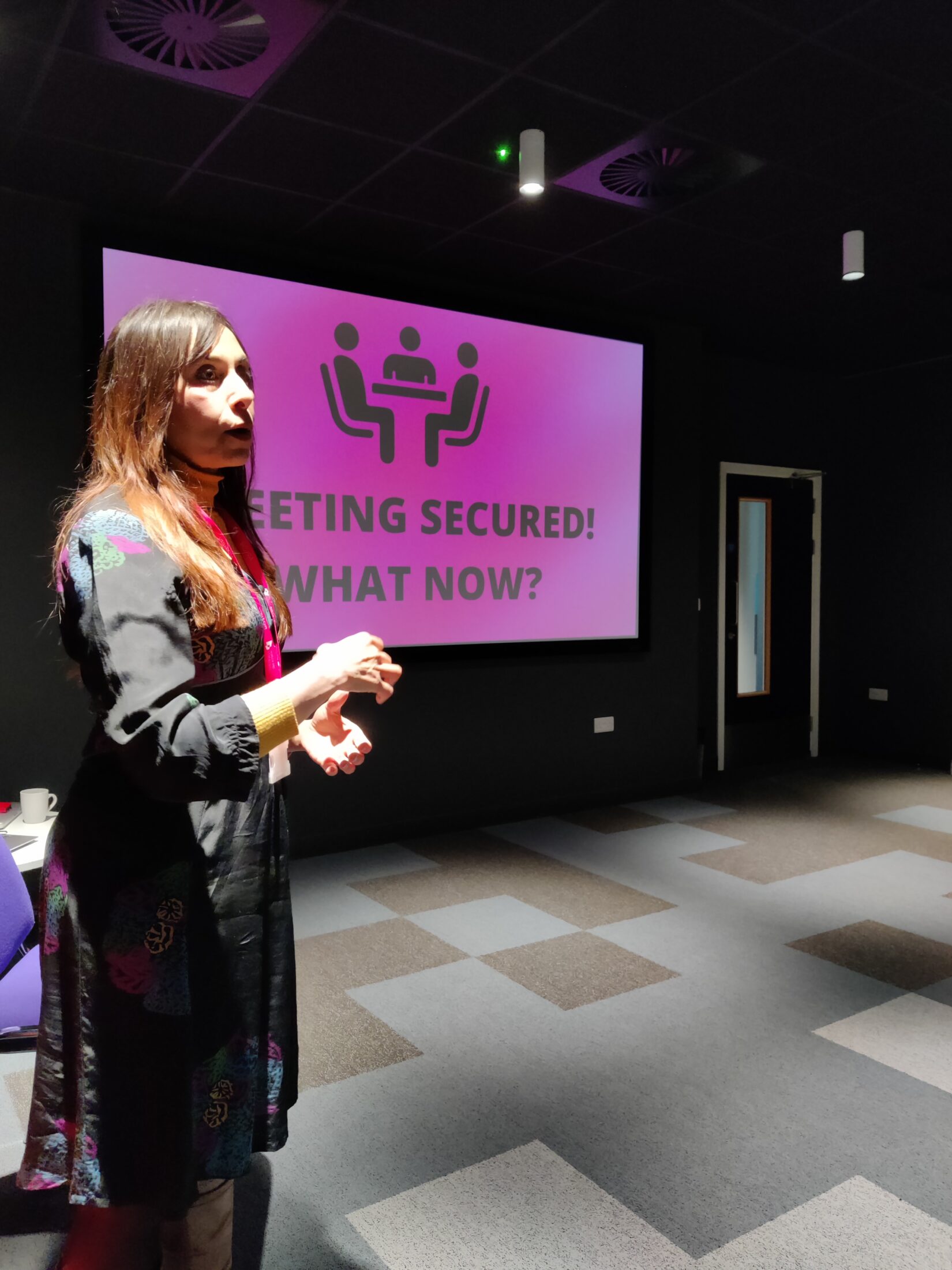A bumper industry recap at Screen and Film School Birmingham: Part 2
Following on from Part 1 of our industry recap from Screen and Film School Birmingham last week, we’re back in the Midlands to look at two more masterclasses that have taken place in Digbeth throughout March and April.
First up, Max Harding and Juwairiyyah Wali from Flatpack Festival came to the Film School to speak to the students about how they could go about replicating the success of their annual film festival, and then a week later Samina Kiyani, who is a highly experienced and successful broadcaster, offered tips and advice on how to build out a CV in an attempt to break into the industry.
Flatpack Festival – Build Your Own Film Night
Every May bank holiday Flatpack Festival take over venues across Birmingham with their “magnificently eclectic” events, and throughout the year they also pop up all over the place, with everything from family activities to al fresco horror. Flatpack’s Max Harding and Juwairiyyah Wali shared their pearls of wisdom about how to put on your very own film event.
Exhibiting film is a vital part of every filmmaker’s journey but is often overlooked despite the fact that all films should be made to be viewed and reviewed. It is now easier than ever to put on your own screenings and moreover, films are a timeless, universal way to start conversations and to break down barriers. Max and Juwairiyyah discussed how to find and choose the perfect film to show, and how added extra features can make an event special, as well as sharing details of how to utilise immersive cinema.
Firstly, Juwairiyyah gave us the low down about an amazing event that she put on celebrating the work of Gurinder Chadha, and particularly one of her early films that she directed before her hit feature, Bend it like Beckham. Juwairiyyah suggested that key features such as DJ sets and art projections can enhance a screening and are also relatively inexpensive.
Max elaborated on this by explaining that it is important to always try to hit five key senses when considering how to put on a film event:
- What do they see when they first enter the venue? Are there dynamic visuals and imaginative décor?
- What do they hear? Is there music or a soundscape?
- How do they feel? Do they feel nostalgic? Do they feel warm, cold, excited?
- What do they smell? Is it food? Or perhaps a fragrance that is connected to the film?
- What do they taste? Is the food on offer relevant?
One of our students then shared their very best immersive cinematic experience and the sensory details behind it.
Film: The Breakfast Club, at our local Mockingbird Cinema.
See: 80’s television with 80’s adverts and TV shows on a loop.
Hear: 80’s music.
Feel: Like they had gone back in time. Pure nostalgia.
Smell: Popcorn.
Taste: Breakfast cereal.
Max and Juwairiyyah went on to say that “creating these cinematic moments through immersive cinema or by having wrap around activities, allows audiences to become part of the film in a way that a normal cinema or at home on a streamer simply can’t provide. Cinematic experiences allow people to engage with film in a different, unique way. Not only that but film exhibition is an important skill to learn for filmmakers and can be a great side hustle to pay your bills whilst you make your own films.” They rounded the masterclass off by leaving the following questions ringing in the ears of our students:
If you had all the budget in the entire world, what film event would you put on?
If you were to put your favourite film on for an audience, how would you make that film come to life before it starts rolling?
For more information on Flatpack Festival’s events/festivals/job and volunteer opportunities, students were encouraged to check out their website: https://flatpackfestival.org.uk/
CV and Networking with Samina Kiyani
Samina is a successful and highly experienced broadcaster and media skills trainer with extensive knowledge of both TV and radio. She started her career behind the scenes as a floor manager and a first assistant director, roles which saw her work across some of the most ground-breaking programmes on British TV, including Big Breakfast, TFI Friday, Who Wants to Be a Millionaire and Big Brother.
The masterclass covered popular CV dos and don’ts and common mistakes. The students left the event with a broader understanding of what the media hiring managers are looking for when recruiting at entry-level.
Samina’s top tips for breaking into the industry by bolstering your current CV were as follows:
- CV layout: make it simple and easy to read.
- Cover letter: show, don’t tell – add links to your most recent work.
- Multiple versions: have multiple versions of your CV drafted to apply for different entry-level roles.
- Be confident: have a go even if you don’t have 100% of the skills listed in a job advert.
- Networking: seize everyopportunity to interact with potential employers.
- Enthusiasm: don’t be too pushy but always show enthusiasm.
Later the students had the chance to exercise their new networking skills at an industry and student networking lunch. Screen and Film School Student President Anna Piggott-Reeves had this to say:
“The CV masterclass and then the networking lunch was a great success and I have had so many great responses from it. I definitely think this is worth doing again at some point as people really loved it and networking is such a good skill to have.”
Two more expert masterclass recaps from Screen and Film School Birmingham. The next one is always just around the corner, and we will bring news of those upcoming events soon.
Are you interested in being a part of the new legacy at Screen and Film School Birmingham?
Sign up to one of our Open Days:
Find out more information on our courses by clicking below:





